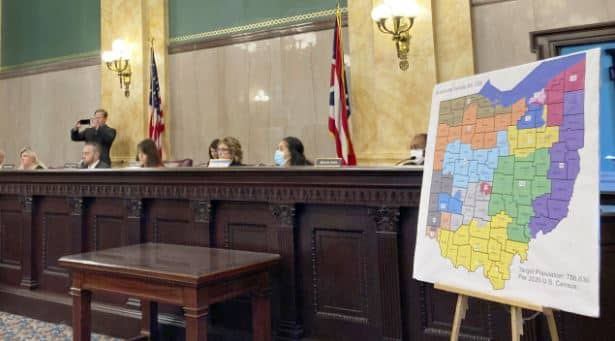Ohio Redistricting Commission Explains Why It Shouldn’t Be Held In Contempt

COLUMBUS, Ohio — The members of the Ohio Redistricting Commission have submitted written explanations for why they missed the deadline for drawing a state House district map after the state Supreme Court threatened to hold them in contempt.
The filing was first reported on the Democracy Docket website.
The Ohio Supreme Court has ordered the redistricting commission to redraw the maps for the state House and Senate districts three times since January, after the body’s first try resulted in a map that would favor Republicans to win two-thirds of the contested seats.
The court tossed the original map, calling it a violation of the Ohio Constitution, and held the mapmakers must render maps that award districts in a proportion that corresponds closely with recent statewide vote totals. In the elections sampled, Republicans received only 54% of the vote.
So far, that hasn’t happened.
And on Feb. 18, Chief Justice Maureen O’Connor of the Ohio Supreme Court, a Republican, ordered the commission to show cause for why its members should not be held in contempt for failure to comply with the court’s order.
In a response filed with the court today, the members of the commission argue they tried to respond to O’Connor’s order in good faith, but simply were unable to agree on a map within the 10-day time frame she laid out.
They also admitted to continued confusion over the meaning of certain concepts inherent to the mapmaking process, such as proportionality and political asymmetry.
The commission asked for a few additional days to continue their work, its members saying they are sure they can adopt a compliant general assembly plan.
The commission further attempts to avoid being held in contempt of court on procedural grounds, arguing O’Connor should have cited House Speaker Bob Cupp and Senate President Matt Huffman, both Ohio Republicans, as individuals, rather than the commission as a body.
Secretary of State Frank LaRose and State Auditor Keith Faber, both Ohio Republicans, also argue they took all reasonable steps to comply with the order, but there was no way for the two of them to enact a map by themselves.
Both men said they had serious doubts about the constitutionality of the original plan, but said questions they raised about the map went unanswered.
Republican Gov. Mike DeWine also argued that he cannot be held in contempt of court because he is only one of seven members in the commission without the capacity to compel action.
DeWine further claims that the redistricting provisions in the Ohio Constitution do not allow the court to compel the passage of a specific plan nor allow them to threaten contempt.
Democratic members of the panel, meanwhile, argue that they did everything in their power to pass their revised plan.
State Sen. Vernon Sykes and House Minority Leader Allison Russo, both Ohio Democrats, said no constitutional deficiencies were raised regarding their map proposal, but the Republican commissioners voted against it and declared an impasse without further effort.
Sykes and Russo are asking the court to either declare their map proposal constitutional or order a briefing schedule to receive detailed explanations and evidence of alleged constitutional deficiencies regarding their map proposal.
The League of Women Voters of Ohio and the American Civil Liberties Union of Ohio are among the groups who filed motions demanding the commission be held to account.
“The majority [of] commissioners delayed until the last minute, and then brazenly refused to comply with the Ohio Supreme Court’s order to produce a new plan,” Freda Levenson, legal director for the ACLU of Ohio said in a press release last week. “We are calling for the court to require them to answer for their defiance.”
Dan can be reached at [email protected] and at https://twitter.com/DanMcCue
























